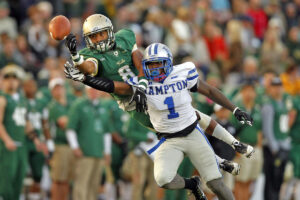Notice: Undefined offset: 1 in /var/www/wp-content/themes/jnews/class/ContentTag.php on line 86
Notice: Undefined offset: 1 in /var/www/wp-content/themes/jnews/class/ContentTag.php on line 86

By Rickey Hampton, Editor and Founder of The African American Athlete,

I hope the people at Hampton University put a call into their HBCU brethren at Tennessee State University, before they decided to move from the Middle Eastern Athlete Conference to the Big South conference.
The Pirates will become only the second Black College athletic program to play in a mainstream conference. The Big South consists of 12 schools, located along the Southeast Seaboard.
“Institutions in the Big South are located in Virginia, North Carolina and South Carolina, which means that our student athletes will spend less time traveling and more time in classes on campus,” said Hampton president David Harvey. “This keeps the proper focus on academics, which is our chief reason for being.”
“The smaller geographic footprint will also reduce travel expenses. Another important consideration is the large number of alumni located in the Big South region.”
There is certainly one vast difference in TSU’s move from an Independent to the mainstream Ohio Valley Conference in 1986, and Hampton. For Hampton, this is something the university decided to do on its own.
The Tigers’ move was political. It came down from the Tennessee Board of Regents. They cited similar reasons including cutting back on travel. The Big Blue played mostly MEAC and SWAC schools, which was difficult on the athletic budget.
So, from a standpoint of travel expenses, class time, and the ability to compete for championships, the move to the OVC made sense
However, having covered the Tennessee State University program in Nashville as a young reporter, I can tell you the Tigers’ move from playing mostly HBCU schools in football, was not well received by the alumni and fan base then, or now.
From the start, the Tigers were the victims of questionable officiating. Why so many questionable calls went against TSU is impossible to say. And, it is virtually impossible to prove they were being slighted by officials.
However, it was clear to me as a reporter that that was the case.
Now, more than 30-years later should Hampton be worried about such an issue?
My answer to that is a resounding “Hell, yes.” If the country can elect a racist, sexual assaulter as president, there are certainly people who will show their bias in officiating games.
There are other issues that Hampton must guard against. The Tigers eliminated yearly games against longtime rivals such like Grambling and Southern, for games against Eastern Illinois and Murray State.
Today, 31-years later, the Tigers still haven’t developed any true rivalries in the OVC, and their attendance and general interest in the program has suffered.
Hampton would be wise to keep its rivalry with Howard University going. The battle of the ‘real H.U.’ is important to their fans and alumni. The same can be said with games with some of the other MEAC rivals such as nearby Norfolk State University and North Carolina A&T University.
There is a reason why the SWAC leads the country in attendance at the FCS level, and the MEAC is No. 5. Fans and alumni enjoy watching the rivalries with other HBCU schools. Incidentally, the Big South is ranked 10th in the country in attendance, and the OVC is ninth.
Also, to stay competitive in the Big South, especially in football, Hampton will also need to recruit more quality white players. Why is that necessary? Because The Pirates will now be competing with schools that are able to recruit quality white players and quality black players.
Think about it, the Big South schools can recruit the same black players as Hampton, and go find quality white players that Hampton probably won’t be successful recruiting. Top tier white athletes are more than likely going to attend a mainstream university. For the most part, white athletes who attend HBCUs are typically there because they had few other, if no other, choices.
Certainly, there will be benefits to playing in the Big South. All the schools are located along the Eastern Seaboard in Virginia, North Carolina and South Carolina.
As Dr. Harvey stated, the ability to play schools in their geographic area makes sense. It will save on travel expenses, and make it easier for student-athletes to attend class, and uphold the tremendous academic tradition of Hampton University.
In the end, it is hard to argue against a move that saves money, and upholds an academic legacy.
However, you can bet there are going to be plenty of Hampton alumni and fans who don’t like the move that erases the tradition of competing against other HBCU schools.



Here is the problem. We cannot get on board with this” Make America Great Again” philosophy as it was back in the day. No offense bro but the HBCU’s have to evolve in the 21st century. Recruiting, Recruiting, Recruiting, is the name of the game and competing in the FCS playoffs and against other FCS schools is the only way to prove it. Kids have a choice now not like it was when you had to go to a HBCU. You can’t recruit good quality players without giving them a chance to compete in playoffs. Players have a dream of the NFL, CFL, Arena and playing these extra games against top competition is the way to do it. When Prairie View beat SFA a couple years ago it did wonders for PV, and HBCU’s. HBCU”s need to recruit better out of high school and stop waiting on D1 transfers, barely qualifying Juco’s. Sell the product bro. Because those white schools are telling players you can’t get to the league from HBCU’s, you don’t graduate etc. So take it to them and beat them on the field not running away.